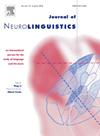词汇神经表征中语法范畴的多层次分离:中国英语学习者的重音典型性效应
IF 1.2
3区 心理学
Q2 LINGUISTICS
引用次数: 0
摘要
本研究的目的是在重音典型性加工过程中,将语法类别从多个层面分离出来,并重点了解汉语学习者的阶级信息是如何表征的。以双音节英语单词为刺激物,在实验1的词汇决策任务和实验2的语法分类任务中,对事件相关电位(ERPs)的P200、N400和后期积极成分LPC进行分析。我们的研究结果表明,表现出不同重音和语法模式的单词之间存在差异,这表明韵律和语法线索在200毫秒左右被分离,并在随后的时间窗口中继续影响词汇获取。此外,直接挖掘语法线索似乎会影响分类的处理方式,因为观察到任务之间的差异。综上所述,我们的研究结果表明,语法类可以在正字法水平上表现出来,并且在早期阶段与韵律分离。此外,中国英语学习者的语法类表征可能是独立于语义的。本文章由计算机程序翻译,如有差异,请以英文原文为准。
The dissociation of grammatical category from multiple levels in the neural representation of words: stress typicality effect among Chinese EFL learners
This study aimed to dissociate grammatical category from multiple levels during the processing of stress typicality, with a focus on understanding how class information is represented among Chinese speakers who learn English as a foreign language (EFL). Disyllabic English words were used as stimuli and three event-related potentials (ERPs) components, including P200, N400, and LPC (late positive component), were analyzed across two tasks that varied in their direct utilization of grammatical cue: lexical decision task in Experiment 1 and grammatical classification task in Experiment 2. Our findings indicate differences between words exhibiting distinct stress and grammatical patterns, suggesting that prosodic and grammatical cues are dissociated early around 200 ms, and continue to influence lexical access into later time windows. Additionally, the direct tapping of grammatical cues appears to impact how classes are processed, as differences between tasks were observed. In summary, our results reveal that grammatical class could be represented at the orthographic level and dissociated from prosody at an early stage. Furthermore, the representation of grammatical class among Chinese EFL learners may be independent of semantics.
求助全文
通过发布文献求助,成功后即可免费获取论文全文。
去求助
来源期刊

Journal of Neurolinguistics
医学-神经科学
CiteScore
3.90
自引率
5.00%
发文量
49
审稿时长
17.2 weeks
期刊介绍:
The Journal of Neurolinguistics is an international forum for the integration of the neurosciences and language sciences. JNL provides for rapid publication of novel, peer-reviewed research into the interaction between language, communication and brain processes. The focus is on rigorous studies of an empirical or theoretical nature and which make an original contribution to our knowledge about the involvement of the nervous system in communication and its breakdowns. Contributions from neurology, communication disorders, linguistics, neuropsychology and cognitive science in general are welcome. Published articles will typically address issues relating some aspect of language or speech function to its neurological substrates with clear theoretical import. Interdisciplinary work on any aspect of the biological foundations of language and its disorders resulting from brain damage is encouraged. Studies of normal subjects, with clear reference to brain functions, are appropriate. Group-studies on well defined samples and case studies with well documented lesion or nervous system dysfunction are acceptable. The journal is open to empirical reports and review articles. Special issues on aspects of the relation between language and the structure and function of the nervous system are also welcome.
 求助内容:
求助内容: 应助结果提醒方式:
应助结果提醒方式:


